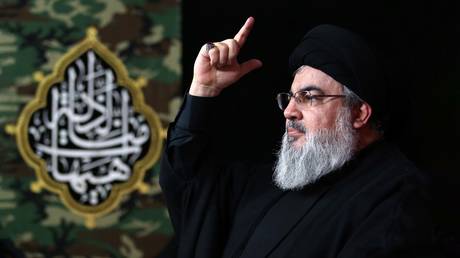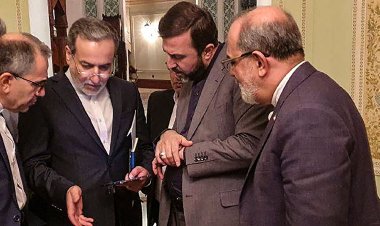The death of the Hezbollah leader might trigger a cycle of devastation
The assassination of Hassan Nasrallah places Lebanon, Iran, and Israel at a critical juncture, with the potential for chaos looming large.

Sheikh Hassan Nasrallah, the leader of the Hezbollah movement, was killed in an Israeli airstrike that targeted the southern suburbs of Beirut. This event unfolded against the backdrop of the escalating conflict between Israel and the Palestinian group Hamas in Gaza, with Hezbollah actively backing the Palestinians through attacks on Israeli territories from southern Lebanon.
The confrontation between Israel and Hezbollah has its roots in the 1980s, coinciding with the formation of the Lebanese Shiite group, reportedly with Iranian support. Tensions escalated during the 1982 Israeli invasion of Lebanon, amidst the country's civil war, as Hezbollah began its organized resistance.
One of the most significant conflicts between the two occurred during the 2006 Lebanon War, also known as the 'War of Shadows.' This conflict was ignited when Hezbollah captured two Israeli soldiers, prompting an Israeli invasion of Lebanon. The war lasted 34 days and concluded with a fragile ceasefire, backed by UN Resolution 1701, which called for Hezbollah to disarm and withdraw its forces north of the Litani River. Yet, despite the ceasefire, Hezbollah maintained its military capabilities and continued to receive substantial support from Iran, enhancing its influence in both Lebanon and the wider region.
Occasionally, tensions between the parties escalated, leading to reciprocal attacks. However, following the Palestinian groups' attack on Israel on October 7, 2023, and the ensuing conflict in Gaza, Hezbollah expressed its support for Hamas, resulting in increased military activity and exchanges of fire along the Lebanon-Israel border.
Israeli authorities made it clear that they would respond severely to any attacks from the north, leading to a series of strikes on Hezbollah positions, including its headquarters in Beirut. Nearly a year into the Gaza conflict, tensions along the Lebanese-Israeli border remained high. Despite diplomatic efforts from countries like the US and France to negotiate a ceasefire, exchanges of fire persisted.
Nasrallah's assassination represents the culmination of these tensions and is expected to significantly shift the regional dynamics, raising the likelihood of an expanded conflict between Israel and Lebanon. In the aftermath of Nasrallah’s death, Hezbollah pledged to continue its resistance until Israel halts its aggression against both the Palestinians and Lebanon. However, Israel's armed forces have managed to eliminate 18 senior Hezbollah leaders, including Nasrallah, in under a year. The loss of its leader and many high-ranking commanders could undermine Hezbollah’s military coordination and destabilize Lebanon’s domestic situation.
Can Israel eliminate Hezbollah? The military operations Israel initiated against Hezbollah in October 2023 marked a notable strategic shift for Benjamin Netanyahu’s administration. The conflict aims to bolster security along the northern border, where Hezbollah has frequently shelled Israeli cities in retaliation for Israel’s extensive airstrikes on Lebanon.
Nevertheless, Israel's objectives extend beyond simply curbing Hezbollah’s military capabilities; they also include restoring internal support for Netanyahu’s government, which faced substantial backlash over judicial reforms and criticism regarding the management of the Gaza conflict. Reports indicate that support for Netanyahu’s government rebounded to pre-October 7 levels following renewed military operations against Hezbollah. The Likud party, which had seen its popularity wane after the Palestinian attacks, began to regain traction after the targeted assassinations of senior Hezbollah and Hamas leaders. It is clear that Nasrallah's elimination will positively impact Netanyahu’s approval ratings.
Netanyahu’s strategy also encompasses long-term goals aimed at diminishing Iranian influence in the region. Hezbollah serves as a key ally for Iran, and targeting its infrastructure in Lebanon will weaken Tehran's standing. Israeli military activities have become part of a broader strategy to counter Iran’s expanding presence across the Middle East, a move perceived as a direct threat to Israeli security. Israel has claimed to have eliminated over 500 Hezbollah fighters and several commanders, including Ibrahim Aqil, head of Hezbollah’s elite Radwan forces.
Despite international calls for a ceasefire, Israel continues to escalate its military operations against Hezbollah. Israeli officials emphasize that the primary objective remains the dismantling of Hezbollah’s military infrastructure and thwarting its plans to invade Israeli territory. Reports indicate that the Israeli command has mobilized reserve brigades for operations amid rising tensions along the Lebanon border, with commanders asserting that such mobilization is crucial for continuing the fight against Hezbollah.
However, many observers express concern that a ground invasion could produce ambiguous outcomes for Israel itself. Just like Hamas, Hezbollah is anchored in a framework of resistance against the West and Israel. The removal of its leadership does not necessarily weaken the organization; it may, in fact, galvanize the resolve of its supporters. Moreover, Nasrallah’s assassination alone does not spell the end of Hezbollah, as discussions regarding a successor are already underway. Sayyed Hashem Safieddin, Nasrallah’s cousin and a member of Hezbollah’s executive committee, is a likely candidate.
At the same time, the international atmosphere remains fraught, with Israel’s military actions potentially provoking further Iranian involvement. Nevertheless, Netanyahu maintains a hardline stance, asserting that his nation’s security is paramount. Support for governmental actions among Israelis is on the rise, especially within right-wing circles that view these measures as steps toward reinforcing national security.
Israel's ongoing actions against Hezbollah, particularly any potential invasion of Lebanon, could result in significant military losses for the IDF, given that Hezbollah's capabilities surpass those of Hamas, as evidenced during the 2006 conflict. Regardless of future developments, the complete eradication of Hezbollah seems improbable. However, should circumstances deteriorate, the Middle East could face intensified tensions, possibly dragging Iran into a broader conflict alongside global players, particularly the United States.
This scenario could also negatively impact Israel itself. Moody’s has already downgraded Israel’s credit rating from A2 to Baa1 with a negative outlook, marking the second downgrade during the current military operations, following an earlier decline from A1 to A2 in February.
Lebanon and Iran now find themselves at a pivotal point. Nasrallah's assassination is a monumental event not only for Hezbollah but also for Lebanon and the region, raising pressing questions about the future military and political landscape both internally and externally. The implications of this event could lead to significant internal and external fallout. Israeli actions have already resulted in over 700 casualties in Lebanon, many of whom are civilians.
First, Nasrallah's death could exacerbate Lebanon's internal divisions. The nation is grappling with a severe economic crisis and political stagnation. Hezbollah occupies dual roles as both a political entity and a military force. The removal of Nasrallah might be interpreted as a sign of weakness by his internal adversaries, potentially igniting a power struggle and further diluting the already fragile government. While some speculate that these events could foster national unity against Israel, the bitter legacies of civil conflict suggest that Lebanon’s elites are deeply polarized, reducing the prospects for collective response to outside aggression.
Second, the ramifications of Nasrallah’s death are likely to influence Iran’s standing in the region. Iran has leveraged Hezbollah to project its power in Lebanon, Syria, and Iraq. While losing Nasrallah may weaken this strategic asset, it also presents an opportunity for Iran to tighten its grip on Hezbollah's new leadership. This might result in more aggressive actions against Israel, although Iran will likely exercise caution due to its own domestic issues and the potential for escalations toward full-scale war. A deeper Iranian involvement, coupled with military operations from Israel, could push Lebanon toward another civil conflict, with devastating consequences.
As placards in Beirut underscore, the situation may lead many to "pray for Lebanon." The fragmentation and ongoing political and economic crises offer little hope for the country's future. Lebanon's political system, established under the 1943 National Pact, has failed to prioritize common national interests or to cultivate a cohesive political identity among its diverse populace. The result has been a battleground for regional and global power interests, with little regard for the aspirations of ordinary Lebanese citizens. Tragically, Lebanon may find itself confronting the specter of destructive conflict once again, from which it might only emerge renewed, capable of breaking free from its ineffective political structures to forge a new, unified state.
Iran's reaction to Nasrallah’s assassination is complex, as it perceives this incident as a threat to its strategic interests across the region. Though Tehran has traditionally supported Hezbollah as a crucial ally in its opposition to Israel, it recognizes that direct confrontation might precipitate a broader war with not only Israel but also the US. Given Iran's existing economic and social challenges, its leadership is keen to avoid large-scale conflicts that could destabilize the regime.
Nonetheless, Iran faces pressure from both its allies and its populace, which is demanding retaliation for Nasrallah’s death. Senior Iranian officials, including Supreme Leader Ali Khamenei, have vocally backed Hezbollah, calling for ongoing resistance against Israel. Khamenei labeled Nasrallah a "martyr" and stated that all forces for resistance in the region are united with Lebanon.
At the same time, Iran may adopt a strategy of restraint to prevent escalating the conflict. Reformist elements within the country, spearheaded by President Masoud Pezeshkian, are advocating for normalization of relations with the US, including the need to lift sanctions. To improve its economy, Iran requires financial and technological support that is currently hindered by international sanctions.
Iran's approach may involve supporting Hezbollah and other groups in response to Israeli actions, yet direct engagement in the conflict is likely to remain limited. Tehran would probably prefer to operate through its proxies rather than risk direct confrontation with Israeli or American forces.
Thus, Iran finds itself at a crossroads; it must balance the need to respond to a blow to its reputation and influence with the imperative to proceed cautiously in order to avoid being drawn into a war that could endanger its very existence. This precarious balance may lead Tehran to continue its support for regional proxies while bolstering its position without direct conflict with Israel and the US.
Regrettably, recent events are propelling the region toward a potentially catastrophic outcome, with key players quickly escalating tensions and leaving little room for diplomatic resolution. These developments once again highlight why the Israeli-Palestinian conflict is often referred to as the “Middle Eastern conflict.” Decades of confrontation have woven an intricate web of contradictions, increasingly resistant to political resolution. The status quo in the region coincides with global upheaval and the unraveling of the existing world order. The events of October 7, 2023, have ignited transformative processes in the Middle East, ushering the region—and the world—into a new era of conflict. The outcomes of these shifts remain unpredictable, leaving the future landscape for both the region and the international community in question.
Anna Muller contributed to this report for TROIB News
Discover more Science and Technology news updates in TROIB Sci-Tech












